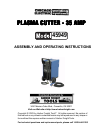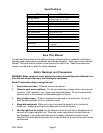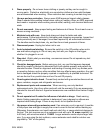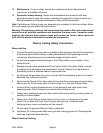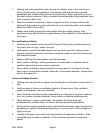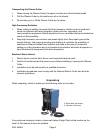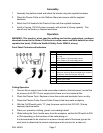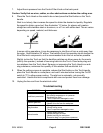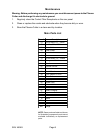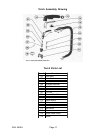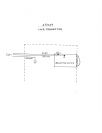Page 5SKU 45949
1. Welding and cutting operations are a source of radiation, noise, hear, and noxious
fumes; for this reason, the protection of the operator and any spectators must be
guaranteed with suitable safety devices and precautions. Never approach arc rays or
hot metal without protection. Failure to observe these standards during operation could
lead to serious health risks.
2. Wear fire-resistant work gloves, a heavy, long-sleeved shirt, trousers without cuffs,
shoes with high insteps to protect skin from arc rays and metal sparks, and a welder’s
helmet to protect hair and face.
3. Always wear safety glasses with side shields under the welding helmet. High
temperature slag may be thrown to great distances. Pay attention to fellow workers in
the vicinity.
Fire and Explosion Safety
1. Position a fire-resistant screen around the Plasma Cutting area to protect persons in
the vicinity from arc rays, sparks, and slag.
2. Clear away or protect flammable objects such as wood, saw dust, clothing, paints,
solvents, petroleum products, natural gas, acetylene, propane, and other substances
with fireproof material.
3. Keep an ABC type fire extinguisher near the work area.
4. Never perform welding or cutting operations on closed pipes or containers as the
possible internal fumes may cause an explosion.
5. Never perform welding or cutting operations on open pipes or containers that may
have come in contact with moisture, chemicals, or flammable materials. Always clean
and dry the areas first.
Fumes and Gases Hazards
1. Welding and cutting fumes and gases may be hazardous if inhaled for long periods of
time.
2. Install a natural or forced-air ventilation system in the work area. If the ventilation
system is inadequate, use an air respirator.
3. Use a forced-air ventilation system when welding or cutting lead, beryllium, cadmium,
zinc, zinc-coated or painted materials. Always wear a protective breathing mask.
4. When welding or cutting in small areas, the operator should be externally
accompanied by another person to observe accident prevention procedures.
5. Do not perform welding operations near chlorinated hydrocarbon vapors produced by
degreasing or painting; the heat generated by arc rays can react to form phosgene, a
highly toxic gas.
6. Irritation of the eyes, nose, and throat are symptoms of inadequate ventilation. Take
immediate steps to improve ventilation. Do not continue operations if symptoms
persist.



